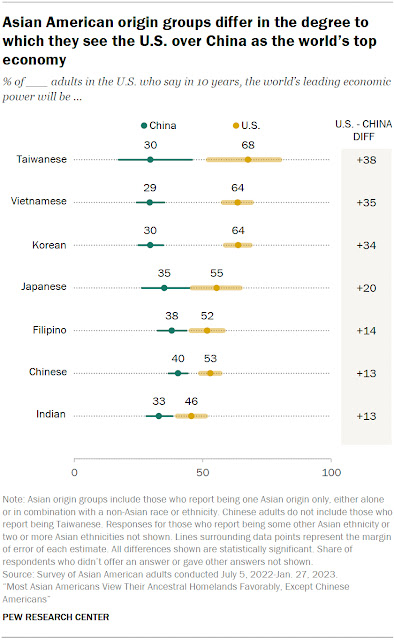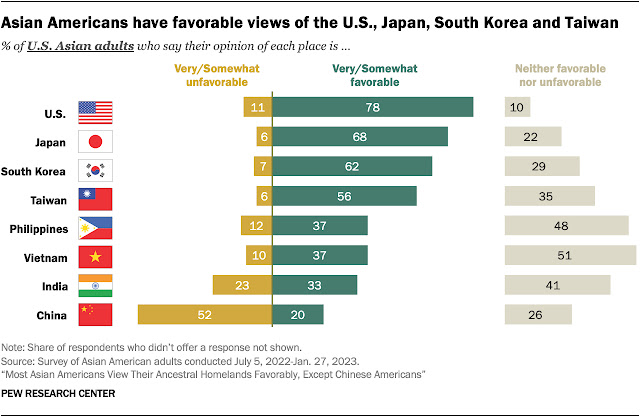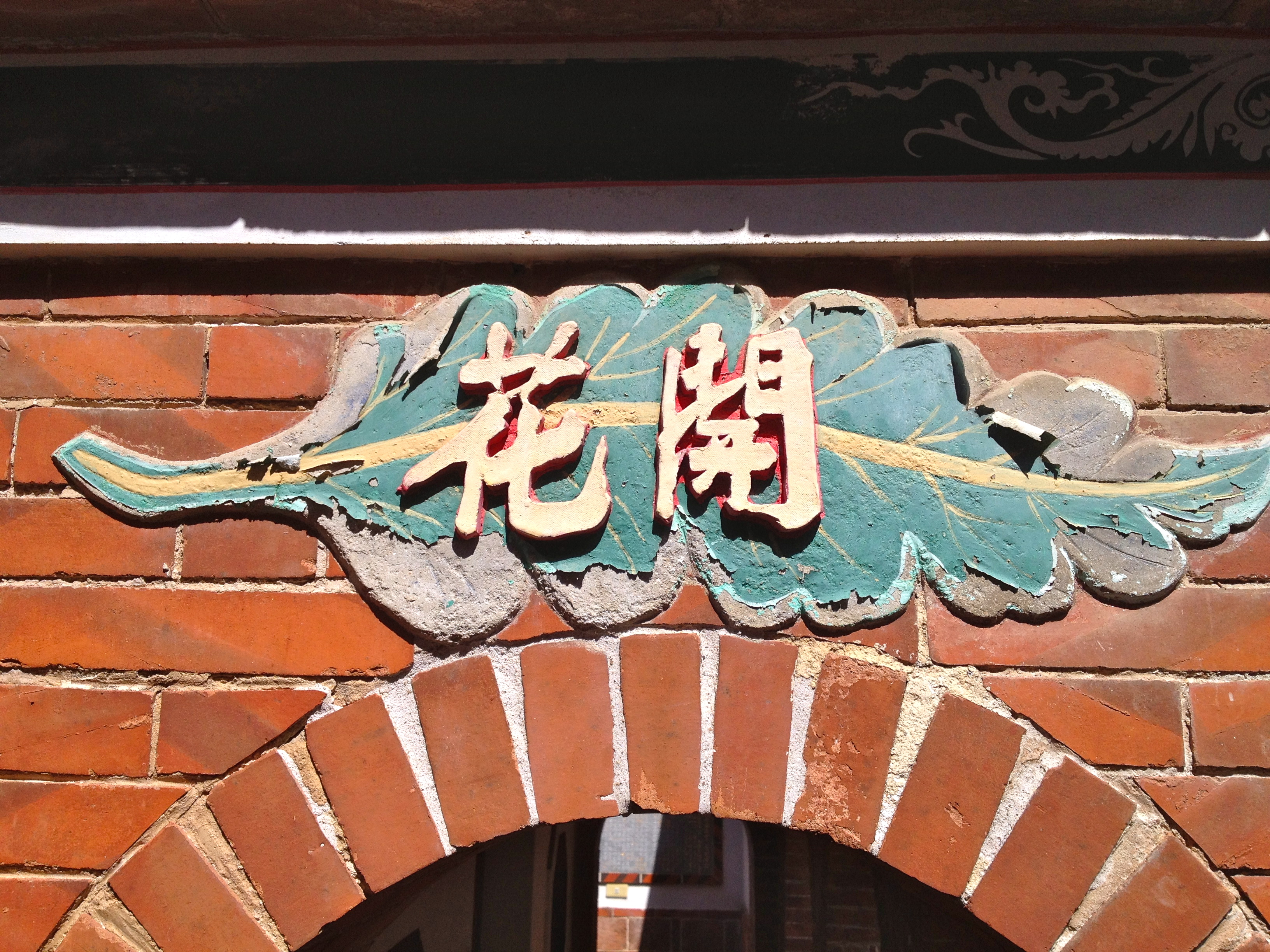Bit of a ponderous title, I know, but I'm writing this quickly. Lots of cool data just dropped from Pew on how Asian Americans feel about their homeland, other countries in Asia, and the US.
You can read all of the data here, including some interesting parts on whether Asian Americans would move (or move back) to their homelands -- most wouldn't -- what immigrants vs. those born in the US think, and who different groups think will be the leading economic power in the coming decade (most still posit that it will be the US, China is a distant second.)
I want to focus on the things I find interesting. Pew, of course, won't speculate on reasons for the data unless they're direct responses from those surveyed. I, however, can do what I like! Just be aware that this is my opinion, and I'm just as capable of being wrong as any other person.
Some of the data is unsurprising: just about every group views their ancestral homeland more favorably than any other group. Taiwanese, South Koreans and Japanese view their own homeland more favorably than anywhere else listed, but that's not necessarily true for every group, with (for instance) Chinese Americans viewing the US, Japan, South Korea and Taiwan more favorably than China. This doesn't shock me: I could imagine viewing democratic nations with advanced economies favorably if you or your ancestors came from China -- famously unevenly developed, and certainly not free and democratic.
Taiwanese have very highly favorable ratings of Taiwan, which is fantastic to see. There's a narrative about that Taiwanese are running away from the "ghost island" because life is getting harder for the middle class, real estate prices are skyrocketing, wages stagnating, and career opportunities curtailed. Perhaps -- Taiwan is hardly perfect -- but that's not reflected in how Taiwanese Americans feel about Taiwan.
There is data on how Chinese Americans view China and Taiwan broken down by whether they're immigrants or US-born, but not Taiwanese Americans. That data is interesting, and I'll show it here, but not really what I want to focus on.
Also unsurprising is the overall negative view of China, even among Chinese Americans. No other group shows this. Even Vietnam, the Philippines and India are favorably looked upon by those with that ancestry....but not China! China is not only widely disliked by Chinese Americans, but Asian Americans in general.
It's also interesting to me that Chinese Americans view Taiwan more favorably than China (62% vs 41%). With all the influence operations coming out of China, backed by massive amounts of money and government support, it must be a blow to the CCP that Chinese Americans still don't like China very much, and in fact Taiwan -- which isn't even trying to court them! -- ranks higher than their own ancestral homeland.
What's more, despite the CCP's attempt to portray the US as well as Asian democracies, especially those with advanced economies, as cesspools of crime, divisiveness and misery, Chinese Americans not only view them more favorably than China, but also think the US will continue to be the leading economic power in the next decade. Although Chinese Americans rank China's potential to be the world's top economy higher than any other group, it's still not a great result for China.
Again, The Media has already created my reaction for me.
While Chinese Americans view China more favorably than any other group does, it's still just 41%. That's quite a bit lower than their favorability towards those aforementioned democracies with advanced economies.
All I can say about this has already been expressed in song. (I prefer the cover, even though I've heard Radiohead hates it).
In addition, as my glee is unbridled, please enjoy this gif of China disseminating non-stop hate at the US, Japan and Taiwan and then getting their comeuppance:
Also unsurprising is how unfavorably Taiwanese Americans view China: although other groups' favorability toward China is quite low, Taiwanese Americans really round out the pessimism at 2%.
Gee, I wonder why.
South Koreans being the only group to view Japan unfavorably was predictable. I'm more interested in how Japanese and Taiwanese view each others' countries. Again unsurprisingly despite the history of Japanese colonialism in Taiwan, Japanese and Taiwanese show an affinity for each other.
Taiwanese rate Japan better than the US, and comparably with Taiwan. After the US and Japan, Japanese view Taiwan most favorably. Living in Taiwan this doesn't really shock me: Taiwanese generally seem to be very into Japan, much more so than Korea despite modern South Korean soft power. I do still hear Taiwanese in Taiwan say they like the refinement of Japanese culture and the cleanliness of Japan, but find Koreans "arrogant" or "hot-tempered". I don't particularly agree with that -- in general I enjoy visiting South Korea -- I'm just reporting what locals have said to me. It's not surprising that it would spill out into an immigrant population.
Basically, Taiwanese like K-pop, Korean dramas and Korean fashion. But as a country to visit, they overwhelmingly seem to prefer Japan. I have been told outright that this is a cultural affinity thing (plus, in general, kanji is readable to Taiwanese whereas Korean is not.)
There's a popular deep blue-red (KMT/Chinese) narrative that Taiwanese love Japan because of some sort of colonized mindset. You know, the dog trained by its master loves its master or something. This also pops up in far left Taiwanese discourse, though perhaps not as much. I don't think it's true: ask just about any Taiwanese if they think Japanese colonialism was a good thing, and they'll say no -- colonization is never "good". But, a lot of Japanese culture seeped into Taiwan in those 50 years, and I can understand a certain perspective that Japanese colonialism, while not "good", was better than the Qing colonialism that came before, and the KMT colonizers that came after.
Yes, the Qing and the Nationalists were/are both colonizing entities on Taiwan. That they came from China and most Taiwanese can trace some or all of their ancestry to China does not matter (and when the Qing arrived, most Taiwanese actually could not say their ancestors were Chinese. Qing settler colonialism changed that). Their mentality was -- and in the case of the KMT, is -- that of the colonizer, and they treated Taiwan like a colony. Some deep blues still do.
Here's something I wonder about: of the three "favorable" Asian countries -- Japan, South Korea and Taiwan -- views of Taiwan are the least favorable, though still clearly over 50%. I would have expected more dislike for Japan overall given their history of colonialism across Asia, but it doesn't play out here. China, the contemporary aggressor, gets a lot more hate (ha ha!) than the historical Japanese empire. South Korea makes sense as they've become a soft power powerhouse.
That could be the same of Japan -- it's easy to forget the atrocities of the Japanese empire when there's a new villain in town, and when post-war Japan has been a major exporter of soft power.
This might also have something to do with Chinese influence operations spewing disinformation about Taiwan that other Asian Americans are picking up on, but given their overall negative view of China, I'm not sure I can support that notion. However, it might play a role, given that positive views of China go up as educational attainment goes down:
Asian Americans with higher levels of educational attainment often feel more positively about the places they were asked about than those with lower levels of formal schooling:
When it comes to views of India, 42% of those with a postgraduate degree have favorable views of the country, compared with 35% of those with a bachelor’s degree and 27% of those with less formal schooling.
The pattern is reversed, though, when it comes to China. Asian Americans with lower levels of education tend to feel more positively about China than those with more education. [Emphasis mine]. For example, 17% of those with at least a bachelor’s degree have positive views of China, compared with 23% of those who did not complete college.
For India, I can see this. To many, it may look like just a "poor country" (again, not a reflection of my opinion, just a common one I've heard). Get a bit more educated about the world and you'll see that it does have a real, if flawed, democracy and a pretty vibrant progressive/left movement. And it's simplistic to call it "poor". Like China, it's complicated.
Honestly, having lived in both countries, I enjoyed India far more, and happily return every few years for a visit. There's a vibrancy to India that China lacks. If I never go to China again, I'll be fine with it.
There is a persistent narrative that Taiwan is less successful than the other Asian Tigers and not quite as nice as Japan. This could have something to do with it -- it doesn't look as shiny as South Korea or Japan for sure (Japan was not an "Asian Tiger" but, given similar levels of development, I'm counting them here).
I don't agree with this: Taiwan has better universal health insurance, solid purchasing power and better wealth equality. Although other countries do outstrip Taiwan in some indicators, all that really tells me given the wealth equality gaps in those countries is that the rich have more, and can do more. I still think there's an argument to be made that despite its faults and imperfections, Taiwan might just be the most successful of the advanced Asian democracies where it really matters.
I don't have much else to say, and I know this is an abrupt conclusion, but I suggest you go read all the data for yourself. It's pretty interesting!







